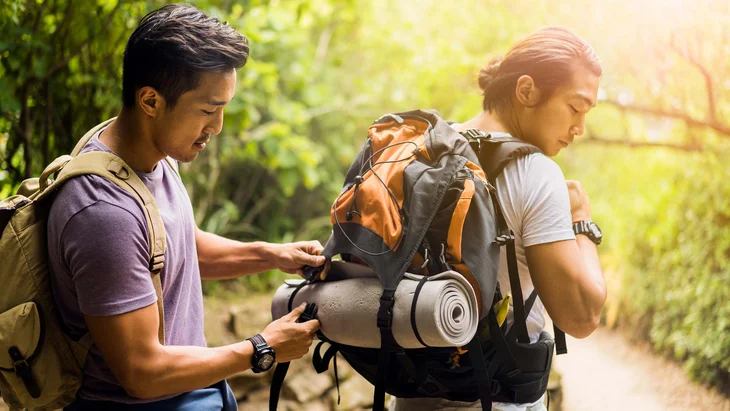Backpacking can be a fun and rewarding experience, but for beginners, it can also be overwhelming and confusing. Many beginners make beginner backpacking mistakes that can put a damper on their trip or even cause harm. In this article, we will discuss the top five beginner backpacking mistakes and how to avoid them. By learning from the beginner backpacking mistakes of others, you can have a successful and enjoyable backpacking trip.
Table of Contents
Not Planning Your Trip
One of the most common beginner backpacking mistakes is not planning your trip. It’s important to plan ahead and do your research on the trail you will be hiking, the weather conditions, and the equipment you will need. Make sure to bring a map and know how to use it. Plan your route ahead of time and let someone know your itinerary in case of an emergency. Also, make sure to obtain any necessary permits for camping or hiking in the area. By planning ahead, you can avoid getting lost, running out of supplies, or getting into dangerous situations.
Overpacking
Another beginner backpacking mistakes make is overpacking. It’s easy to get carried away and bring too much gear, but this can make your backpack heavy and uncomfortable to carry. Only bring what you need and leave the non-essentials at home. Make a list of necessary items, including clothing, food, and water. Remember, you can always wash clothes or purchase additional supplies if needed. By packing light, you’ll have a more enjoyable trip and won’t tire yourself out before you even hit the trail.
Ignoring the Weather
Ignoring the weather is another common beginner backpacking mistake made by a backpacking beginner. It’s important to check the weather forecast before heading out and prepare accordingly. Bring appropriate clothing for the conditions, such as rain gear or warm layers. Be aware of the signs of hypothermia and heat exhaustion and know how to treat them. If the weather is too severe, consider postponing your trip or choosing a different route. By being prepared for the weather, you can stay safe and comfortable on your trip.
Not Testing Your Gear
One mistake that can ruin a backpacking trip is not testing your gear ahead of time. Don’t wait until you’re on the trail to discover that your stove doesn’t work or your tent is missing pieces. Set up your tent and test your equipment before you leave. Make sure you know how to use everything and that it’s in good working order. This includes your backpack, sleeping bag, and any other gear you plan to bring. By testing your gear beforehand, you can avoid frustration and make sure everything is in working order.
Not Bringing Enough Water
Water is essential for backpacking, but many beginners don’t bring enough. It’s important to stay hydrated, especially in hot or dry conditions. Plan ahead and know where you can refill your water supply along the trail. Bring a water filter or purification tablets in case you need to drink from a natural source. Don’t rely on finding water sources along the way, as they may be dry or contaminated. It’s better to carry a little extra weight in water than risk dehydration on the trail.
Not Packing Out Your Trash
One of the beginner backpacking mistakes that can have a negative impact on the environment is not packing out your trash. Make sure to bring a trash bag and pack out everything you bring in, including food wrappers and toilet paper. Don’t leave any trash behind, even if it’s biodegradable. It’s important to leave the trail and campsite cleaner than you found it. Not only does this help preserve the natural beauty of the wilderness, but it also protects wildlife from consuming harmful human waste. Always follow the principle of Leave No Trace and practice responsible outdoor ethics.
Going Alone
Backpacking alone can be a dangerous mistake for beginners. It’s important to have a partner or group with you for safety reasons. Hiking with someone else can help you stay on track and provide help if needed. If you do decide to go alone, make sure to let someone know your itinerary and expected return time. Bring a personal locator beacon or satellite phone for emergency situations. Don’t take unnecessary risks, and always prioritize safety over any desire to push yourself.
Underestimating the Trail
Beginners often underestimate the difficulty of the trail they are hiking. It’s important to do research ahead of time and know the trail’s difficulty level. Don’t attempt a difficult trial if you are not physically prepared or have little experience. Start with easier trails and gradually build up to more challenging ones. Know your limits and listen to your body. Don’t push yourself too hard and risk injury or exhaustion. By being honest with yourself about your abilities and limitations, you can have a safe and enjoyable backpacking trip.
Conclusion – Beginner Backpacking Mistakes
Backpacking can be an exciting and rewarding experience for beginners, but it’s important to avoid common beginner backpacking mistakes to ensure a successful trip. Plan ahead, pack light, and test your gear before you go. Be prepared for the weather, bring enough water, and always pack out your trash. Hike with a partner or group, and don’t underestimate the difficulty of the trail. By following these tips, you can avoid beginner backpacking mistakes and have a safe and enjoyable adventure in the great outdoors.




